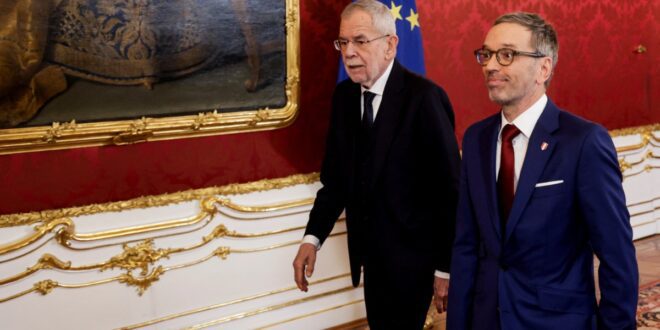Austrian President Tasks FPO Leader with Forming Coalition Government
Austrian President Alexander Van der Bellen has tasked the leader of the far-right Freedom Party (FPO), Herbert Kickl, with forming a coalition government after a centrist bid to assemble one without the FPO collapsed unexpectedly over the weekend.
Monday’s announcement marks a dramatic reversal by the president, a former leader of the left-wing Greens who has long been critical of the FPO and has clashed with Kickl, but few options remained for him after the centrists failed to forge a coalition.
FPO’s Rise to Power
The eurosceptic, Russia-friendly FPO won last September’s parliamentary election with 29 percent of the vote. It will now enter talks with its only potential partner, the conservative People’s Party (OVP), seeking to lead a government for the first time since it was founded in the 1950s under a leader who had been a senior officer in Hitler’s elite paramilitary SS.
Protests and Controversy Surrounding Kickl’s Appointment
As the 56-year-old Kickl left his meeting with the president, hundreds of protesters, including Jewish students and left-wing activists, booed, whistled, chanted “Nazis out” and waved banners with slogans such as “We don’t want a right-wing extremist Austria”.
Van der Bellen had infuriated the FPO by not tasking it with forming a government soon after the election since no potential coalition partner was immediately forthcoming. That task fell to the OVP and its leader, Chancellor Karl Nehammer. The OVP came second in the election.
Potential Coalition and Uncertainty
Analysts have said a coalition led by the far right with the conservatives as junior partners is now highly likely. Nehammer’s attempts to assemble a three- and then two-party coalition with other centrist parties fell apart this weekend, prompting him to announce his resignation.
If coalition talks fail, a snap election is likely, and polls suggest support for the FPO has only grown since September.
Election Program and Policies of the FPO
In its election programme titled Fortress Austria, the FPO called for the “remigration of uninvited foreigners” to achieve a more “homogeneous” nation by tightly controlling borders and suspending the right to asylum via an emergency law. It has also called for an end to sanctions against Russia and criticized Western military aid to Ukraine.
Kickl has criticized “elites” in Brussels and called for some powers to be brought back from the European Union to Austria. The OVP and the FPO overlap on some of these issues, particularly over taking a tough line on immigration.
 Mind Uncharted Explore. Discover. Learn.
Mind Uncharted Explore. Discover. Learn.
